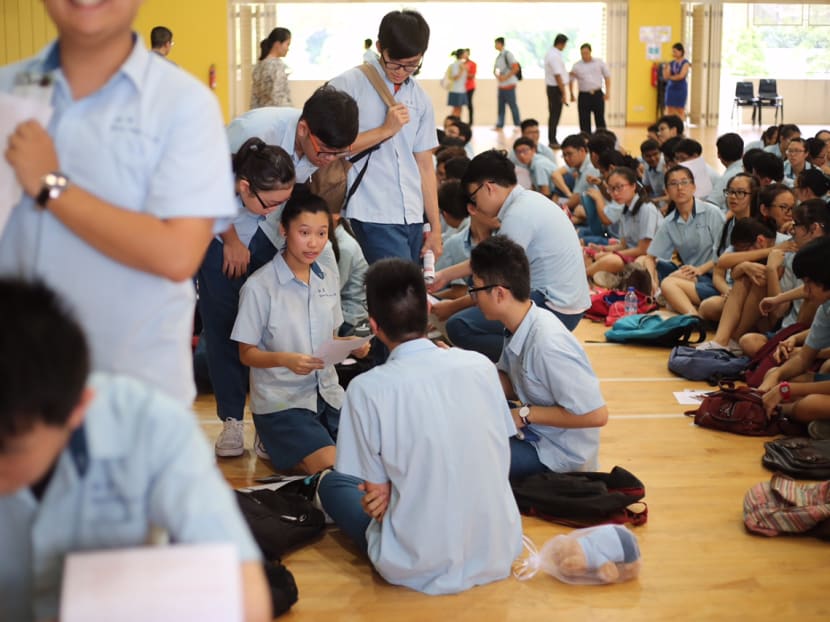GCE O- and N-Level exams to be replaced by new national common exam in 2027
SINGAPORE — A new common national examination will be introduced by the Ministry of Education (MOE) in 2027 to replace the current GCE O- and N-Level examinations and this will complement the subject-based banding system that is set to replace streaming in secondary schools.

Students collecting their GCE O-Level examination results at Yuan Ching Secondary School. Under the new subject-based banding system, there will be a new secondary school curriculum and each subject will be categorised into three tiers: General 1 (G1), General 2 (G2), and General 3 (G3).
SINGAPORE — A new common national examination will be introduced by the Ministry of Education (MOE) in 2027 to replace the current GCE O- and N-Level examinations and this will complement the subject-based banding system that is set to replace streaming in secondary schools.
Education Minister Ong Ye Kung made the announcement on Tuesday (March 5) at his ministry’s Budget debate in Parliament, where he also revealed that secondary school streaming will be scrapped by 2024 after about four decades.
Under the new subject-based banding system, there will be a new secondary school curriculum and each subject will be categorised into three tiers: General 1 (G1), General 2 (G2), and General 3 (G3).
The G1 level will correspond to today’s Normal (Technical) standard, G2 to Normal (Academic) and G3 to Express.
Starting from Secondary 1, students can pursue subjects at different levels according to their abilities.
In order to reflect that subject-based banding is a “more flexible, single course”, Mr Ong said the MOE will put in place a common national examination in 2027, where all Secondary 4 students will get a common certificate. It will list the subjects completed and the standard band of each subject.
For instance, students will attain a common certificate with various subject permutations — six G3 subjects and one G2 subject, or five G3 and two G2, or two G3, three G2 and one G1, and so on.
Read also
Secondary school streaming to be abolished in 2024, replaced with subject-based banding
Timeline: How secondary school streaming evolved over the decades
MPs double down on calls to abolish ‘sacred cow’ of streaming in secondary schools
Mr Ong said that the certificate will be co-certified by both Cambridge Assessment and Singapore “as both are strong international brand names in education, which will enhance the recognition and value of the certificate”.
Currently, Express students sit for the GCE O-Level examination, while Normal (Academic) and Normal (Technical) students sit for the GCE N-Level examination at the end of Sec 4.
The new examination framework will affect admissions into post-secondary institutions such as the junior colleges (JCs), polytechnics, and the Institutes of Technical Education (ITEs).
Mr Ong said that his ministry will review the post-secondary admission process so that students taking a combination of G1, G2 and G3 subjects can be fairly considered for JCs, polytechnics and ITEs.
“Our review will recognise students’ particular strengths that make them suitable for specific post-secondary courses,” he added.
There is also the question of whether there will be a Sec 5 level under the subject-based banding system, said the minister. Currently, Normal (Academic) students who perform well in the GCE N-Level examination can go on to Sec 5, where they will then sit for the GCE O-Level examination.
Mr Ong said that for these students, going to Sec 5 and taking the GCE O-level examination is a pathway to polytechnics and JCs.
However, with the subject-based banding system, the plan is to get students to go through a four-year curriculum by the time the new system takes effect in 2024.
The MOE will explore other alternatives to a fifth year in secondary schools so that students can enter post-secondary institutions.
One such alternative is having a similar programme to the Polytechnic Foundation Programme, which allows the top 15 per cent of the Sec 4 Normal (Academic) cohort to do a foundational year in the polytechnics before pursuing their diploma courses.






